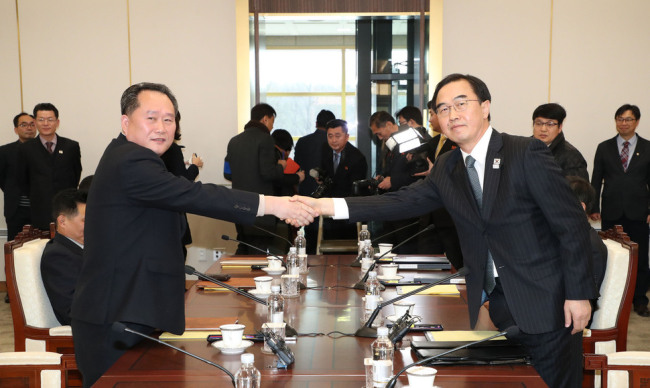Seoul and Pyongyang are likely to focus on finalizing details of the inter-Korean summit scheduled for April when the two sides hold high-level talks on Thursday.
“A summit’s success can depend on how much progress has been made throughout its preparation process,” said Kim Yong-hyun, a professor of North Korean studies at Dongguk University.
 |
| Cho Myoung-gyon, South Korean Unification Minister (right) and Ri Son-gwon, chairman of North Korea`s Committee for the Peaceful Reunification of the Country shake hands at a high-level meeting held in Panmunjom on Jan. 9. (Yonhap) |
“The main goal of the upcoming high-level talks will have to be about finalizing a specific date for the inter-Korean summit and discussing agenda items linked to the summit,” he added.
North Korea on Saturday accepted South Korea’s proposal to hold high-level talks on Thursday to discuss the date and agenda items for an inter-Korean summit scheduled to take place in late April, Seoul’s Ministry of Unification said Saturday.
South Korea’s three-member delegation will be led by Unification Minister Cho Myoung-gyon, according to Seoul’s message to Pyongyang via a border communication channel on Thursday. Cho’s counterpart will be Ri Son-gwon, chairman of the Committee for the Peaceful Reunification of the Country, the North’s agency that handles inter-Korean affairs, Seoul said, citing Pyongyang’s response.
The meeting will take place at the Tongilgak administrative building on the northern side of the border truce village of Panmunjeom.
The upcoming talks will be the second such meeting between Cho and Ri, who previously met at Panmunjeom on Jan. 9 to hammer out details on North Korea’s participation in the PyeongChang Olympics and bringing about an improvement in bilateral relations.
The Jan. 9 talks was the first formal meeting of the two Koreas in more than two years, following a period of frozen inter-Korean ties precipitated by the North’s continued pursuit of nuclear and missile programs.
“North Korea likely tapped Ri in light of the smooth progress and solid result of the January high-level talks, to show its willingness to cooperate with the South in hosting the inter-Korean summit,” said Kim from Dongguk University.
Another analyst pointed out that the Moon Jae-in administration would have to set a clear foundation for Moon-Kim talks during the March 29 meeting to prepare a less bumpy road toward its goal of achieving peace and stability on the Korean Peninsula.
“Ways to bring about the denuclearization of the peninsula, declaration of the end of the Korean War, and how to expand civilian exchanges between the two Koreas will have to be considered and discussed,” said Shin Beom-chul, a professor at the Korea National Diplomatic Academy.
Moon’s road map for the denuclearization of the Korean Peninsula appears to be in line with the peace declaration signed on Oct. 4, 2007 following the second inter-Korean summit between liberal President Roh Moo-hyun and North Korean leader Kim Jong-il in Pyongyang.
The declaration called for a nuclear-free peninsula and a permanent peace pact between the two Koreas through dialogue and negotiation. The two Koreas remain technically at war, as the 1950-1953 Korean War ended in a truce.
Also noting the appointment of security hawk John Bolton as the new national security adviser in the US, Shin highlighted the role of the Moon-Kim summit, taking place before the planned meeting between US President Donald Trump and North Korea’s Kim in May, in preventing a quick deterioration of the current mood set for Trump-Kim talks.
“South Korea needs to get a solid response from North Korea on the issue of denuclearization because the North’s willingness to bring its nuclear issues on the table is the reason US agreed to hold talks with Kim in the first place,” said Shin.
“There is a possibility that the US may shift back to strengthening its pressure campaign against North Korea if the North’s response is about maintaining its nuclear weapons program instead of a noteworthy change,” the Seoul-based expert added.
Shin even raised the possibility of a US announcement of a new level of maritime interdiction operations against North Korea to further hobble the Kim regime and its nuclear weapons program, if the North makes what Washington views as a “wrong step.”
By Jung Min-kyung (mkjung@heraldcorp.com)

